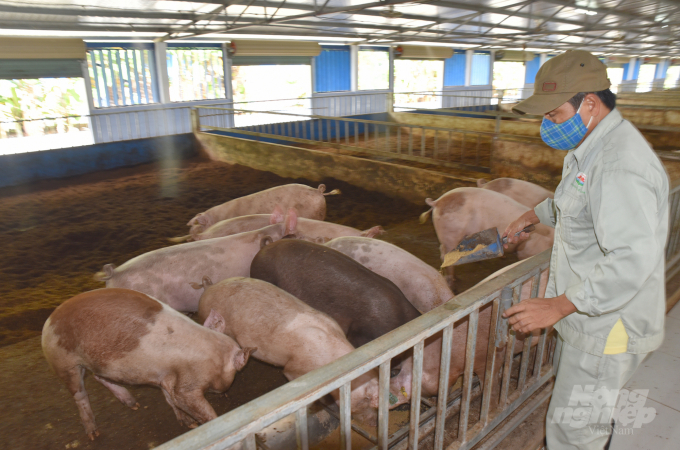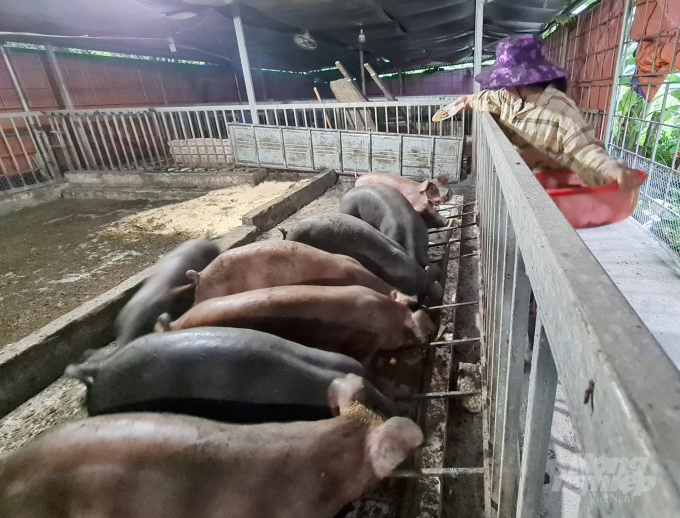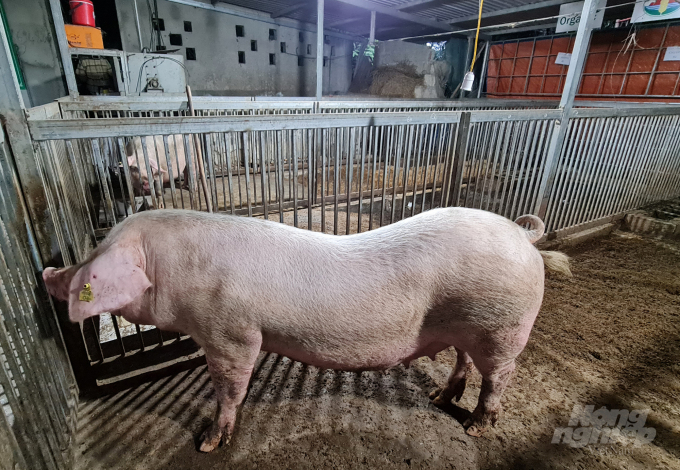
The regeneration of pigs is the most important task of livestock farming in Thua Thien – Hue. Picture: Vietnam Khanh.
The regeneration of pigs is identified as an urgent task
The above work is urgent, but when it comes to implementation, progress is incredibly slow because Thua Thien – Hue Province cannot play the leading role, so the pressure is on the shoulders of the district and the breeder.
Statistics of recent years, Thua Thien – Hue has about 22,000 households raising pigs. Most still engage in traditional agriculture mixed with small-scale residential areas, increasing pollution and disease spread.
In Thua Thien-Hue, African swine fever has spread to nearly 9 counties, towns and cities, with nearly 13,330 households holding infected pigs, and has forced the destruction of nearly 75,550 heads with a total weight of nearly 4,600 tons. The outbreak of the disease led to a significant decline in the province’s total pig herd, which reduced revenue, created an imbalance between supply and demand, and drove up product prices.
In order to overcome the above shortcomings and soon stabilize the livestock industry, the Thua Thien-Hue Provincial People’s Committee has issued a pig rearing plan related to the post-epidemic livestock restructuring in 2020-2025.
The overall goal of the project is to get the disease well controlled, soon to herd again to stabilize production, stabilize prices and ensure an adequate supply of clean food to consumers. Dissemination of legal documents on animal husbandry, veterinary medicine, biosecurity measures and organic animal husbandry.
The rebreeding and stock increase must be accompanied by a restructuring of pig farming. Reorganize forms of production, gradually reduce small livestock farming, switch to concentrated animal husbandry, farm scale … to ensure sustainable development of animal husbandry.
The program will use the central budget, the provincial budget, the district budget, the non-business capital of the National Target Program for the Construction of New Rural Areas, the provincial development investment fund loan and the capital of investors.
The total estimated cost for district-level projects spanning 5 years is approximately VND210 billion, of which companies and growers invest VND148 billion (70%), with budget support of VND62 billion (30%). Central government and provinces: VND 43.4 billion; District Budget Support: VND18.6 billion).
According to the different plan, the support funds from the budget will be mainly focused on the period 2021-2023 to stimulate the re-herd and enlarge the pig herd (representing 80% of the total funding). Support 10%/year from 2024-2025 to undertake advocacy work, encourage scaling, increase herd towards organic, biosecurity…

It looks quite flashy, but the process of implementing the Thua Thien – Hue pig rearing project did not bring the expected results. Picture: Kong Dien.
Fast project approval, slow allocation of funds
So far, Phong Dien, Quang Dien, Phu Loc, Nam Dong and A Luoi districts have actively participated in the implementation of the above policy, but this is not enough. The reality shows that even in places with extreme difficulties (typically the mountainous district of A Luoi), the potential of these places is limited, so after 2 years of basic implementation, only a small part of the requirements can be met.
Conversely, the People’s Committee of Thua Thien – Hue Province has not fundamentally outlined the budget as planned up to this point. The province could not play the leading role, the subordinate units were visibly confused. To minimize risk, most decisions are made in moderation, resulting in slow turtle progress.
Once again, after this district project was approved, the A Luoi shantytown took positive steps to direct municipalities and cities to organize propaganda and mobilize people to band together to carry out the reconstruction work. However, due to uncertainty after the event, the cash inflow was out of reach for farmers, so few individual models were formed.
Among them, the biosecurity pig farming model that treats waste with biogas has attracted nearly 70 households in 3 communes, Son Thuy, Lam Dot and Hong Van. More precisely, the district has closely associated with a typical company in the livestock sector, which has introduced 4 models of organic pig farming in the municipalities of A Ngo, Hong Bac, Quang Nham …. There have been generally positive signals, however, amount has not penetrated anywhere.
Not only did A Luoi embrace bitter fruits ahead of the half-hearted move by Thua Thien-Hue Province People’s Committee (approval of resettlement project but slow allocation of funds), but other districts in the beneficiary area were clearly troubled.
More specifically, Phu Loc District People’s Committee has allocated only 500 million of the budget to support 400 breeding pigs for meat production for 11 households applying biosecurity breeding. The District Office for Agriculture and Rural Development has just organized a training course on husbandry techniques and disease prevention for 30 farmers.

Two years have passed, but the actual results in A Luoi and other beneficiary districts are very worrying. Picture: Kong Dien.
When comparing the goals and plans for 2021 – 2022 (35 participating households, rearing 105 sows, 1,260 pigs), what Quang Dien District can achieve is not achieved. In the entire district, only 24 households with a total of 79 sows and 882 pigs are registered to participate. The theory is but the reality is much more tragic, as of the end of May 2022 only 4 households have housed pigs in extremely small numbers (19 sows and 162 pigs).
In Phong Dien District, things are even more confusing. According to the decision No. 1453/QD-UBND of June 15, 2021 of the provincial people’s committee, the provincial people’s committee issued the plan No. 195/KH-UBND of July 15, 2021 on the implementation of the project for the period 2021 – 2025, whereby the municipalities instructed to develop the scheme of concentrated livestock areas to organize the implementation in the approved areas. In turn, 2 municipalities Phong An and Phong Dien Town officially left the game due to improper planning.
More worryingly, the remaining 5 communes (Dien Mon, Dien Hoa, Dien Hai, Phong Hien and Phong Thu) are in an unprepared state: Phong Thu and Dien Hoa communes have only approved the task of subdivision planning and into infrastructure concentrated animal husbandry invested areas, implementation of the plan of 20 hectares; Dien Mon and Dien Hai townships are considering submitting an area of 13 hectares to the provincial people’s committee for approval; The municipality of Phong Hien completes the dossier.
Finally, the situation in Nam Dong district was not pleasant, so the whole district recorded 45 households / 9 communities participating in the model with a number of 135 sows and 1,100 meat pigs, but all of them stopped at this step.
Many reasons were given, but the key lies in the decision of the Thua Thien-Hue Provincial People’s Committee. The VND210 billion project cannot achieve the goal if it is still applied in the form of counting crabs in the hole, as has been the case for a long time. It is necessary that this province needs a major renovation before things go too far.
Mr. Nguyen Van Hung, director of Thua Thien-Hue Province Animal Husbandry and Veterinary Medicine Subdivision, cited a number of reasons for the delay, including the unallocated provincial budget, districts’ limited capital resources and some localities not yet approved regulations and master plans for Concentrated livestock areas and have yet to deal with conversion procedures. Some low-lying townships of Quang Dien District (Quang An, Quang Phuoc, Quang Thanh) lack land funds for concentrated livestock, infrastructure is not guaranteed, the cost of building barns to avoid flooding is quite high, so the Development process quite extensive. Modeling is still difficult. In addition, the sales market is generally stable, the disease situation in the pig herd was complicated in the past, which significantly affected the psychology of farmers.

